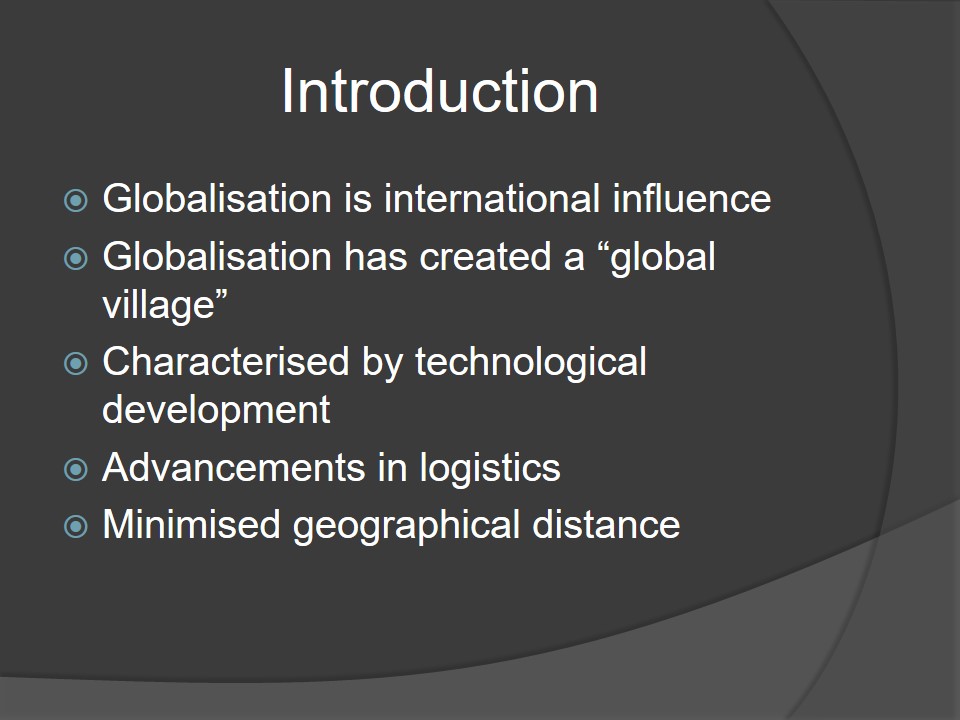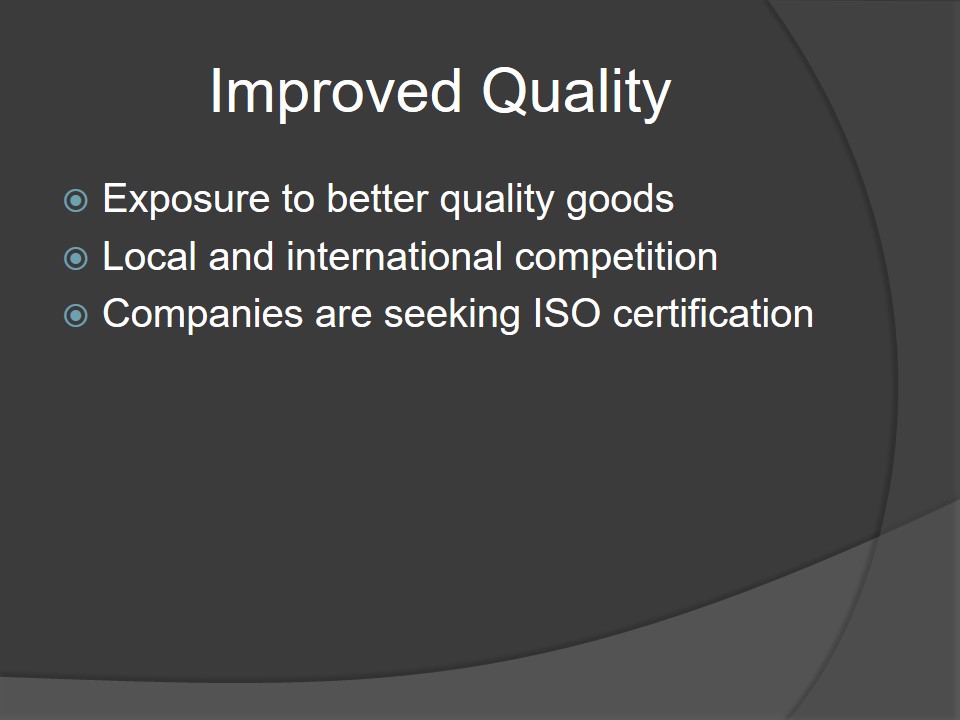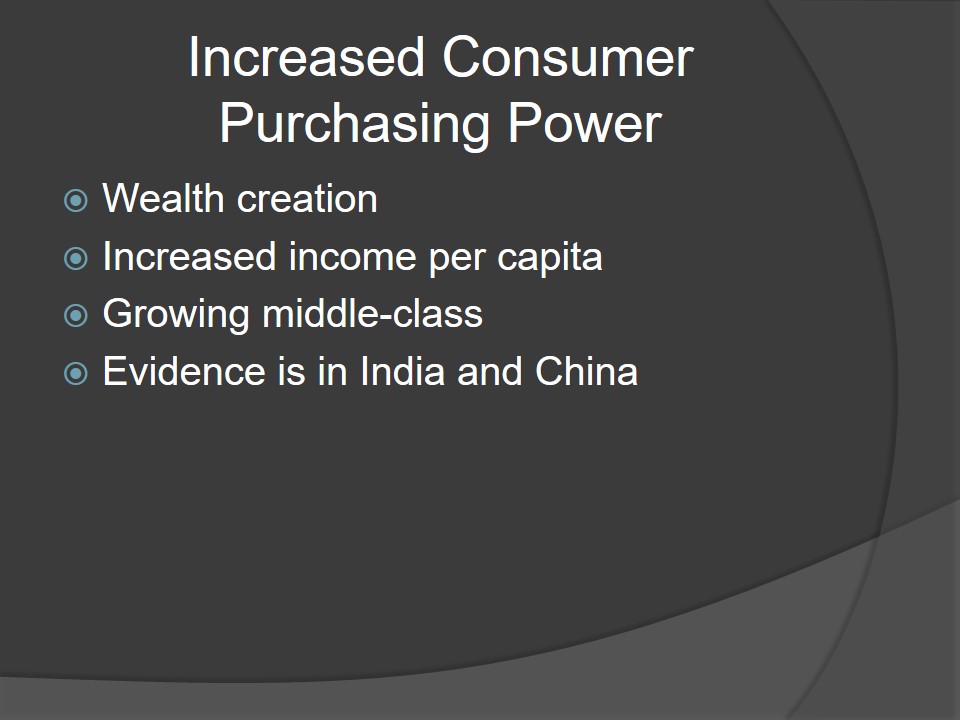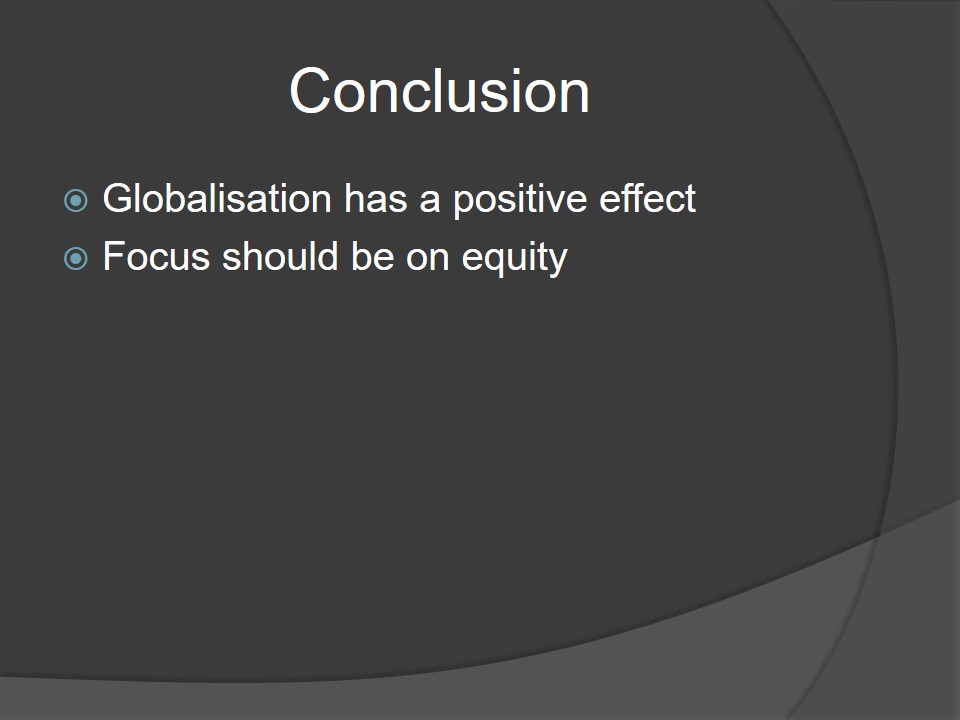Introduction
- Globalisation is international influence.
- Globalisation has created a “global village”.
- Characterised by technological development.
- Advancements in logistics.
- Minimised geographical distance.
Globalisation is one of the most significant trends affecting businesses in the 21st century. Its growth has been underpinned by several factors, including the development of technology, standardisation of organisational practices, and advancements in logistics operations, which has allowed people who were geographically separated to trade seamlessly (Dagdeviren, Lund-Thomsen & McCann 2017). Although developments in technology have created a “global village,” there is a debate regarding the net effects of globalisation on business performance. Consequently, there are several conflicting effects of this trend on companies. In this presentation, I will holistically explore the benefits and challenges of globalisation and review the counterarguments. Lastly, at the end of the presentation, I will demonstrate that globalisation has had a positive effect on businesses. This presentation will contain three key parts. In the first one, I will explain counterarguments of globalisation and refutations. The next three slides will show its positive effects and in the last section, I will summarise the findings of the study.

Counterarguments and Refutation
- “Kills” local businesses.
- Increases competition.
- International agencies are addressing challenges.
Although several researchers have highlighted the positive contributions of globalisation to businesses, a similarly growing body of literature continues to document some of its negative effects (Kovalčíková 2014). Particularly, such pieces of literature have highlighted the negative effects of globalisation on local businesses by suggesting they undermine their potential to make a profit by allowing giant multinational companies, which enjoy huge economies of scale to provide goods cheaply and at a price that local competitors cannot match. As ElGindi (2017) insinuates, this trend could cause some local industries to shut down.
Globalisation has also led to increased competition for businesses in both developed and developing markets. This trend has caused heightened business rivalry among competitors and even paved the way for the emergence of unethical business practices. However, the establishment of some international firms, such as the international labour organisation has helped to mitigate some of these challenges.

Expanded Trade Opportunities
- Import and export opportunities.
- Improved synergies.
- Better Communication.
One of the most positive effects of globalisation on businesses is the expansion of trade opportunities. For example, internationalisation has created opportunities for entrepreneurs to import and export goods and services (Bryan 2014). These opportunities are pegged on several social and economic factors, such as the use of the English language, which is the most preferred mode of communication among international trading partners. For example, by using English as a common language, businesspersons can learn about trading opportunities in other parts of the world and exploit them for commercial gains. Therefore, globalisation allows businesses to communicate more effectively and create synergies for purposes of economic advancement.

Improved Quality
- Exposure to better quality goods.
- Local and international competition.
- Companies are seeking ISO certification.
Globalisation has also helped businesses to improve the quality of their products and services because the expansion of markets means that they do not only have to compete with local businesses but international ones as well. At the same time, international trade has exposed consumers to better quality goods and services through competition, thereby prompting them to demand better quality products from their local companies (Ebell & Riley 2017). Therefore, for businesses to maintain their market share, they need to respond accordingly. The quest by companies to be ISO certified demonstrates the positive impact of globalisation on organisations because the trend has forced them to improve their operations to gain such certification. These firms and their customers are benefitting in almost equal measure because businesses get to learn about international best practices in the development of quality products and services, while customers benefit from improved quality of goods purchased.

Increased Consumer Purchasing Power
- Wealth creation.
- Increased income per capita.
- Growing middle-class.
- Evidence is in India and China.
According to researchers, such as Bauer and Gegenhuber (2015), globalisation has created more wealth for people than the world has ever seen before. Indeed, through the breakdown of trade barriers across different countries, businesses have improved their performance by increasing their income streams and improving their global brand presence (Bauer & Gegenhuber 2015). The increase in wealth has also benefitted nations and consumers alike. This development can be seen through improvements in income per capita, especially for underdeveloped countries (Baldwin 2016). The growing middle class in China and India (among other Asian countries) verifies this fact because increases in purchasing power have been buoyed by a growing prominence of international trade (Jones & Lluch 2015). Consequently, there has been a new submarket of consumers, which could be exploited through improved business strategies. Companies have an opportunity to tap into this market and create more wealth for themselves and their host communities. The increased consumer purchasing power means that businesses have new opportunities for making more profit because they can appeal to a demographic that has a heightened potential to buy goods and services. Consequently, there is an opportunity for these firms to benefit from increased revenue and sales.

Conclusion
- Globalisation has a positive effect.
- Focus should be on equity.
In sum, although the negative effects of globalisation could affect business performance, it is important to weigh the costs and benefits of the trend to have a holistic understanding of its effects on business performance. In other words, globalisation has had a more positive than negative effect on businesses, as is evident through the creation of wealth across multiple economies and the success of multinationals in global operations. Therefore, the real conversation people need to have is about equity because the globalisation has largely had a positive effect on businesses.

Reference
Baldwin, R 2016, The great convergence, Harvard University Press, Cambridge, MA.
Bauer, RM & Gegenhuber, T 2015, ‘Crowdsourcing: global search and the twisted roles of consumers and producers’, Organization, vol. 22, no. 5, pp. 661-681.
Bryan, C 2014, Handbook of research on global business opportunities, IGI Global, London.
Dagdeviren, H, Lund-Thomsen, P & McCann, L 2017, ‘Multiple paths through the complexities of globalization: the next three years of Competition & change’, Competition & Change, vol. 21, no. 1, pp. 3-9.
Ebell, M & Riley, R 2017, ‘Globalisation: local and sectoral impacts’, National Institute Economic Review, vol. 242, no. 1, pp. 1-2.
ElGindi, T 2017, ‘Natural resource dependency, neoliberal globalization, and income inequality: are they related? A longitudinal study of developing countries (1980–2010)’, Current Sociology, vol. 65, no. 1, pp. 21-53.
Jones, G & Lluch, A 2015, The impact of globalization on Argentina and Chile: business enterprises and entrepreneurship, Edward Elgar Publishing, London.
Kovalčíková, N 2014, ‘Globalisation and the threats it poses in the twenty-first century’, European View, vol. 13, no. 1, pp. 169-179.